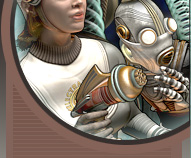He could make nothing of the Orb. It had no visible moving parts. It did have buttons of some kind: when Osgood pressed them in a certain order the Orb lit up from within and murmured a low-pitched hum. After about seven minutes it would turn itself off again.
That was all he could make it do.
Within a week the watchmaker was neglecting his customers. Unfinished work began to pile up on his workbench: he solved this problem by packing it all away to make more room for his experiments on the Orb. His reputation began a long and, it seemed, an unstoppable decline.
He couldn't determine what elemental force was providing the Orb's power. He suspected that it was electrical - for electricity was known already, in those days - but he had no idea what fueled it or how it was modulated. Osgood gradually came to believe that he would never understand the artifact, much less unlock its trove of secrets.
And so he began, instead, to wonder what those secrets might be. All the accumulated knowledge of a dead race from the stars.... Before that prospect Osgood's mind felt like an empty bowl.
They must have had flying ships like the one the stranger had tried to reach. Osgood could no longer think of that fellow as a madman. For a ship to ride the wind, he reasoned, it must be lighter than the air; and what material might be lighter than the air itself? Questions like this began to take up more of Osgood's attention and over time he found himself staring at the globe itself less and less often.
He had become something of a recluse. His neighbors wondered what he was doing, closed up in his shuttered workshop. The day they found out was the day that Osgood completed his first airship, which he sailed off across the rooftops, and from there, into histor




